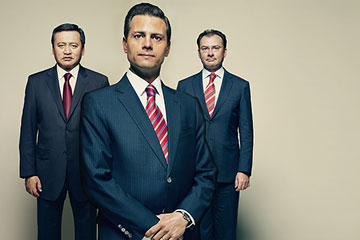
Left to right: Miguel Ángel Osorio Chong, Interior Minister; Enrique Peña Nieto, President; Luis Videgaray Caso, Finance Minister
(5 of 5)
Chong insists otherwise. "We are not mixing security with politics," says the Interior Minister, who, it may be worth noting, has a political background as a former governor of the Mexican state of Hidalgo. Speaking from his private office--the better to avoid a part of town paralyzed by street protests--he adds that the drug fight has been focused by centralization of authority under his control and that his government has captured some prominent drug lords, including the sadistic leader of the Zetas cartel, Miguel Ángel Treviño Morales, in July 2013.
Skeptics scoff at this sunny narrative. Murders have slowed in some areas, but other crimes have spiked. In late January, the President unveiled a new initiative to combat a recent epidemic of secuestro, as kidnapping for ransom is known.
And then there is the crisis in Michoacán, where the emergence of armed vigilante groups is a disturbing echo of Colombia's descent into a kind of low-grade civil war in the 1980s. "Nobody knows who the hell these people are--whether they are honest, bona fide vigilante groups or whether it's one cartel fighting another," says Jorge Castaãeda, former Mexican Foreign Minister.
"What's happening in Michoacán is really worrisome," says Shannon O'Neil of the Council on Foreign Relations. "If you can't fix rule of law, I don't see how the economic side can thrive."
Peña Nieto doesn't deny that Michoacán is a serious problem. "We need to re-establish the rule of law" in the state, he says. (The next day, he announced a $3.4 billion social and infrastructure investment package.) But, he adds, "we are regaining territorial control." He grabs a chart from his chief of staff that shows violence dropping in several troubled cities.
This is a common complaint from Mexican officials: that broad security advances are overshadowed by shocking but localized acts of violence. "Sometimes people see the events but not the statistics," says Chong.
A senior Obama Administration official expresses sympathy. "It's a big country," he says, recounting a nervous call from a U.S. auto-industry executive headed to a large Mexican city for a convention. The official's advice? Relax. "It's the equivalent of, you're going to L.A. for a convention and you hear about a big shoot-out or hostage taking in Alabama. Would you feel unsafe?"
Not that security is the only obstacle to an economic boom. For one thing, last year's reforms still require a wave of so-called secondary legislation to spell out their details. Passing it will take hard work, although the good news is that, unlike last year's template-setting constitutional reforms, which required two-thirds majorities in Congress, these laws require only a simple majority.
Peña Nieto takes a long view. "We are not [working] only with a short-term goal," he says. "We have a broader horizon, without thinking about what the polls are saying."
Even if some reforms fall short, it has been a long time since Mexico experienced grand political bargains, a growing economy and optimism about the future. The idea might have been laughable until recently. But is it possible that America's leaders could learn a thing or two from its resurgent southern neighbor?
--With reporting by Dolly Mascareñas/Mexico City
Correction: An earlier version of this post misidentified the Director of the Mexico Institute at the Woodrow Wilson International Center for Scholars as Gordon Wood.
